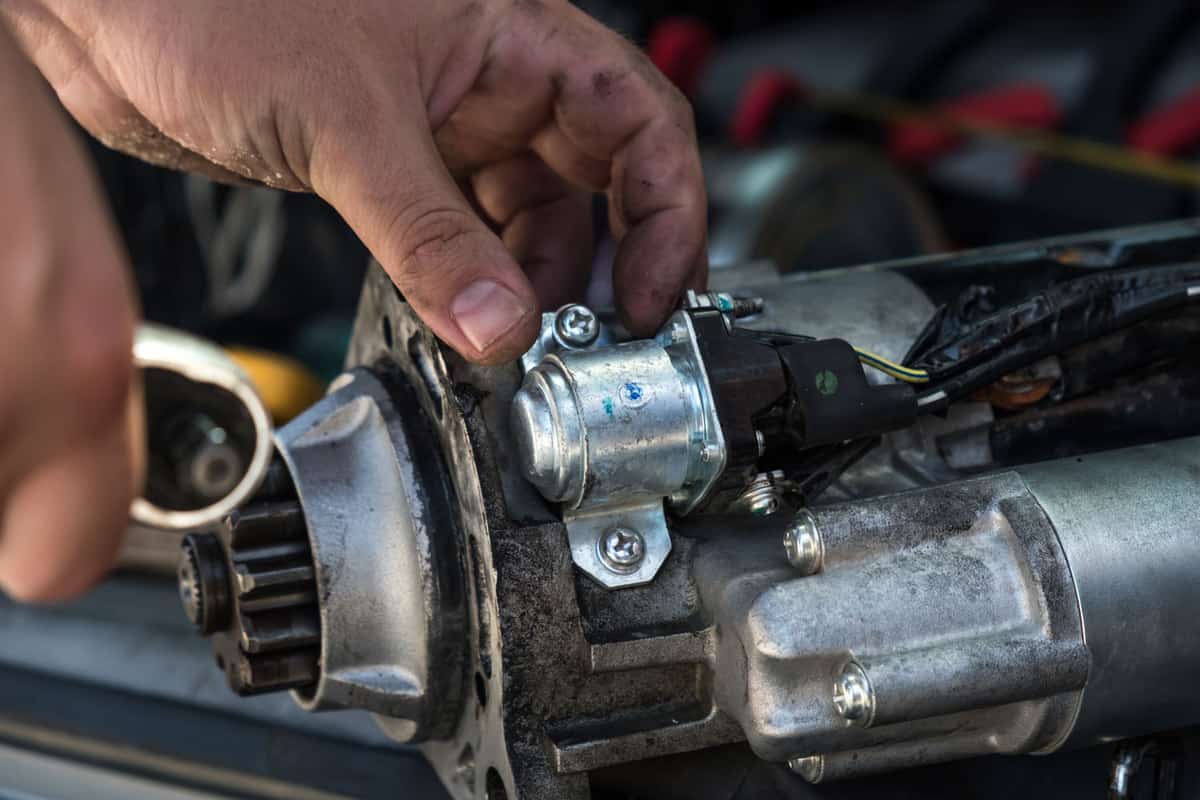Is your Toyota 4Runner not starting and giving you a clicking sound when you try to start it? We researched this problem and have the solution for you.
When all you get is a clicking sound when starting your Toyota 4Runner, then the problem could be the electrical supply or the start-up system. The number of clicks that you hear is a clue as to what is causing the problem. A single clicking sound points to a possible starter motor or starter relay problem, while multiple clicking sounds hint at a possible power supply problem—the car battery or alternator.
Let’s look deeper into each of the four possible causes of the problem. Then we’ll talk about the possible resolution to the issue. Read on!

What is a starter or starter motor?

A starter is a critical component of the start-up system of your Toyota 4Runner. It is responsible for starting the cycle inside the engine.
How does a starter work?
An internal combustion engine, like the one in your Toyota 4Runner, is an example of a feedback system. Once they have started, the inertia from the current cycle starts off the next cycle.
A good example is a four-stroke engine. The third stroke releases enough energy to provide power to the engine’s load, the fourth stroke—the exhaust—and start up the first and second stroke—the intake and compression.
However, when the engine is not running, you’d need an external source of energy to start off the cycle. This is where the starter motor comes in.
The starter motor provides the initial energy to kick off the first stroke of the feedback cycle and then powers itself off. When all you hear is a clicking sound from your Toyota 4Runner when you try to start it, that means that the starter motor is not running to kick off the cycle of the engine.
What can cause the starter to stop working?

There are several reasons why a starter is not running. Here are the possible culprits:
Loose wiring
Loose wiring to and from the starter can make it hard for it to get a consistent supply of electrical power to function properly. This can even cause your starter to not get any electrical power at all to start up.
Worn out parts
Damaged or worn-out starter parts will also prevent your starter from functioning properly. This is usually the result of natural wear and aging.
According to Mercedes-Benz of Scottsdale, a starter motor’s lifespan can be anywhere between 30,000 miles to 200,000 miles. Or, when looking at it from another perspective, it can start your Toyota 4Runner 80,000 times.
Oil leaks
Oil leaks can also cause starter problems. There are times when the starter is the unfortunate receiver of oil leaks because of where it is located.
Oil leaks can damage the starter. An engine leak is a problem that is commonly ignored. Whenever you discover an engine leak, it is best to check the starter for oil soak because it can cause sudden failure of the starter.
What are the signs of a bad starter?

A clicking sound is a common symptom of a bad starter.
Another sign of a bad starter is when you have lights on the dashboard, but the engine won’t start. This means that your Toyota 4Runner has electrical power that is not reaching the starter or that the starter is unable to convert the electrical energy to start the engine.
Grinding noises when you try to start your Toyota 4Runner are also a symptom of a bad starter. This symptom should not be ignored because it can damage the engine’s flywheel.
What is a starter relay?
According to T&X, a starter relay is a small electrical component that serves as a switch for the starter solenoid. It uses the small current from the ignition switch to close a circuit with a much larger current.
How does a starter relay work?
When you turn on the ignition to start the engine of your Toyota 4Runner, the starter relay sends a small amount of electrical energy to the starter solenoid that goes to pull a large chunk of power from the car batteries. The starter solenoid then sends this large chunk of electrical energy to the starter motor to start up the engine’s cycle.
What can cause a starter relay to stop working?
Corroded contact is the most common cause of a starter relay failure. Corrosion in the electrical contacts reduces their conductivity and stops the electrical flow.
A faulty circuit can also cause the starter relay to stop working. This can cause the electrical current to keep going to the starter relay even after the ignition switch has been turned off.
An electrical current that is beyond the rated capacity of a starter relay (usually caused by a malfunctioning circuit) can damage the starter relay or burn it out.
End-of-life is also a common cause for starter relay failure. They can get too worn out to work properly.
What are the signs of a bad starter relay?
When you start your Toyota 4Runner, a bad starter relay will make clicking sounds, but will not be able to power up the starter motor because there is no power getting there.
Another sign of a bad starter relay is causing the starter motor to run continuously.
A starter relay should close the electrical circuit after the engine has started. This will cause your starter motor to shut off after it has done its task. A faulty starter relay that doesn’t close the electrical circuit after the engine has started up will cause the starter to keep running.
This problem can damage the starter and the flywheel. There are other possible causes of this problem, not just the starter relay. So it is best to take your Toyota 4Runner to a mechanic or a service center once you experience this issue.
The DB Electrical 410-52434 replacement starter for a Toyota 2.4L 4Runner is available on Amazon. Check it through this link.
The alternator and the car battery
The alternator and the car battery work as a single unit. The alternator converts mechanical energy into electrical energy that the car battery stores for future use.
How do an alternator and a car battery work?
The car battery provides the initial power that your Toyota 4Runner needs to start up the starter relay and the chunk of power that the starter solenoid needs to startup the starter motor.
Once the engine has started running, the alternator receives mechanical energy from the engine and converts it to electrical energy. This electrical energy powers all the electronic systems of the Toyota 4Runner, while the excess is used to charge the car battery.
What can cause the alternator and the car battery to stop working?

In most cases, alternators go bad due to age and natural wear.
Engine leaks can also cause an alternator to fail. If oil gets to the alternator, it can damage the components of the alternator and cause it to fail prematurely. Power steering fluid getting to the alternator has the same damaging effect.
While the alternator can survive splashes of water, getting completely submerged in water or mud can damage it. Have your alternator checked immediately if it experienced getting submerged.
Batteries also go bad naturally due to age—and they have a much shorter lifespan than alternators. A car battery should be replaced every 3-5 years. However, extreme temperatures and frequent short-distance driving can also shorten the life of your car battery.
Corroded and loose contacts can degrade the performance of your car battery. If your alternator is having a problem, your battery might not be able to charge while you’re driving.
What are signs of a bad alternator?
Before your alternator dies, you’d notice some symptoms that it is starting to go bad.
1. Intermittent stalling
Your alternator is starting to go bad if your engine starts to stall randomly. If it cannot charge your car battery, it might no longer be able to provide sufficient electrical energy to the engine’s fuel injectors.
2. Malfunctioning electrical systems
Another common symptom is that your electrical systems cannot function at a normal level. You might notice that your headlights or your interior lights are dimmer than normal or that they flicker from time to time. Additionally, your automatic windows might open and close slower than usual.
3. Strange noises
Alternators convert mechanical energy from the engine into electrical power. It is connected to the engine through a belt. If this belt becomes misaligned, loose, or worn out, you will hear squeaking or odd noises coming from under the hood. Additionally, a worn-out belt will no longer be able to spin the alternator fast enough to generate electrical energy.
Moreover, there are bearings inside the alternator that produces a humming noise as it becomes worn out. This sound becomes more intense as the bearings get worn even further.
When you notice any of these symptoms, have a mechanic check your alternator immediately even if your car is still running well. Do not wait for the alternator to completely fail and leave you stranded with an unpowered Toyota 4Runner in the middle of nowhere.
The DB Electrical 400-52073 replacement alternator for Toyota 4runner is available on Amazon. Check it through this link.
What are signs of a bad car battery?
If your Toyota 4Runner is taking a long time to start, then it might be time to replace your battery. If your Toyota 4Runner intermittently starts normally, it can also mean that your battery needs replacement.
Conclusion
A clicking sound when you start your Toyota 4Runner means that the engine is unable to start. Understanding the possible reasons why this happens can help to make you understand what should be done to fix the issue.
If you enjoyed this article, you might be interested in the following too:


